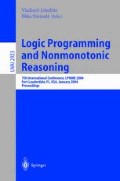Abstract
We present a declarative language, \(\mathcal{PP}\), for the specification of preferences between possible solutions (or trajectories) of a planning problem. This novel language allows users to elegantly express non-trivial, multi-dimensional preferences and priorities over them. The semantics of \(\mathcal{PP}\) allows the identification of most preferred trajectories for a given goal. We also provide an answer set programming implementation of planning problems with \(\mathcal{PP}\) preferences.
The research has been partially supported by NSF grants EIA0220590, EIA0130887, CCR9875279, CCR9820852, and CCR9900320.
Access this chapter
Tax calculation will be finalised at checkout
Purchases are for personal use only
Preview
Unable to display preview. Download preview PDF.
References
Babovich, Y.: CMODELS, http://www.cs.utexas.edu/users/tag/cmodels.html
Bacchus, F., Kabanza, F.: Using temporal logics to express search control knowledge for planning. Artificial Intelligence 116(1,2), 123–191 (2000)
Bistarelli, S., et al.: Labeling and Partial Local Consistency for Soft Constraint Programming. In: Pontelli, E., Santos Costa, V. (eds.) PADL 2000. LNCS, vol. 1753, p. 230. Springer, Heidelberg (2000)
Blum, A.L., Furst, M.L.: Fast Planning through Planning Graph Analysis. AIJ 90 (1997)
Brewka, G., Eiter, T.: Preferred answer sets for extended logic programs. AIJ 109 (1999)
Cimatti, A., Roveri, M.: Conformant Planning via Symbolic Model Checking. Journal of Artificial Intelligence Research 13, 305–338 (2000)
Cui, B., Swift, T.: Preference Logic Grammars: Fixed Point Semantics and Application to Data Standardization. Artificial Intelligence 138(1-2), 117–147 (2002)
Delgrande, J., Schaub, T., Tompits, H.: A framework for compiling preferences in logic programs. Theory and Practice of Logic Programming 3(2), 129–187 (2003)
Eiter, T., et al.: Answer Set Planning under Action Cost. In: Flesca, S., Greco, S., Leone, N., Ianni, G. (eds.) JELIA 2002. LNCS (LNAI), vol. 2424, p. 186. Springer, Heidelberg (2002)
Eiter, T., et al.: The KR System dlv: Progress Report, Comparisons, and Benchmarks. In: Int. Conf. on Principles of Knowledge Representation and Reasoning, pp. 406–417 (1998)
Fages, F., Fowler, J., Sola, T.: Handling Preferences in Constraint Logic Programming with Relational Optimization. In: Penjam, J. (ed.) PLILP 1994. LNCS, vol. 844. Springer, Heidelberg (1994)
Gelfond, M., Lifschitz, V.: Action languages. ETAI, 3(6) (1998)
Gelfond, M., Lifschitz, V.: The stable model semantics for logic programming. In: ICLP 1988 (1988)
Haddawy, P., Hanks, S.: Utility Model for Goal-Directed Decision Theoretic Planners. Technical report, University of Washington (1993)
Kautz, H., Walser, J.P.: State-space Planning by Integer Optimization. In: AAAI (1999)
Le, H., Pontelli, E., Son, T.C.: A Java Solver for Answer Set Programming. NMSU (2003)
Lifschitz, V.: Answer set planning. In: ICLP, pp. 23–37 (1999)
Long, D., et al.: International Planning Competition
Myers, K.L.: Strategic Advice for Hierarchical Planners. In: KR 1996 (1996)
Myers, K.L., Lee, T.J.: Generating Qualitatively Different Plans through Metatheoretic Biases. In: AAAI (1999)
Niemelä, I., Simons, P.: Smodels - an implementation of the stable model and well-founded semantics for normal logic programs. In: Fuhrbach, U., Dix, J., Nerode, A. (eds.) LPNMR 1997. LNCS, vol. 1265, pp. 420–429. Springer, Heidelberg (1997)
Putterman, M.L.: Markov Decision Processes – Discrete Stochastic Dynamic Programming. JohnWilley & Sons, Inc., NewYork (1994)
Schaub, T., et al.: A Comparative Study of Logic Programs with Preferences. IJCAI (2001)
Son, T.C., Baral, C., McIlraith, S.: Domain dependent knowledge in planning – an answer set planning approach. In: LPNMR 2001, pp. 226–239. Springer, Heidelberg (2001)
Son, T.C., Pontelli, E.: Reasoning about actions in prioritized default theory. In: JELIA (2002)
Author information
Authors and Affiliations
Editor information
Editors and Affiliations
Rights and permissions
Copyright information
© 2003 Springer-Verlag Berlin Heidelberg
About this paper
Cite this paper
Son, T.C., Pontelli, E. (2003). Planning with Preferences Using Logic Programming. In: Lifschitz, V., Niemelä, I. (eds) Logic Programming and Nonmonotonic Reasoning. LPNMR 2004. Lecture Notes in Computer Science(), vol 2923. Springer, Berlin, Heidelberg. https://doi.org/10.1007/978-3-540-24609-1_22
Download citation
DOI: https://doi.org/10.1007/978-3-540-24609-1_22
Publisher Name: Springer, Berlin, Heidelberg
Print ISBN: 978-3-540-20721-4
Online ISBN: 978-3-540-24609-1
eBook Packages: Springer Book Archive

